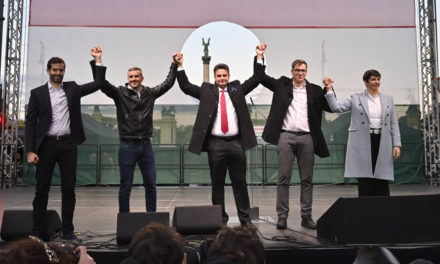There is a warlike atmosphere in the European Union, the vast majority of the member states would deliver more weapons to Ukraine for even more money, even faster, while the pro-peace actors are under severe attack, Minister of Foreign Affairs and Trade Péter Szijjártó stated on Monday in Luxembourg.
According to the announcement of the Ministry of Foreign Affairs and Trade, the head of the department announced at the press conference held during the break of the meeting of the EU Foreign Affairs Council for the first time that another Hungarian citizen had been evacuated from the war-torn Sudan, and he and his spouse are now safe in Ethiopia, where they are being helped by the staff of the Hungarian embassy. At the same time, he added that since the middle of the previous night, it was not possible to contact the other five Hungarians staying in Khartoum due to the collapse of the internet and telephone service, but if there are any developments, the ministry will inform them immediately.
Reporting on the Luxembourg council meeting, he highlighted that it started again with "self-blame", many believed that the EU still did not do enough to support Ukraine.
"If we wanted to summarize what the position of the majority of European countries is currently expressed here, we could roughly do it by delivering even more weapons, for even more money, to Ukraine even faster. This war atmosphere also includes the fact that those who are in favor of peace, those who speak out for peace, are still under serious political and verbal attacks, whether it is from countries present here or not present here, which are constantly arguing for peace" .Péter Szijjártó also touched on the topic of Ukrainian grain exports, recalling that the government agreed to the creation of the so-called solidarity routes in order to alleviate the global food crisis, but the reality turned out differently.
"The vast majority of grain and food products delivered from Ukraine stopped in Central Europe, stopped in the countries neighboring Ukraine, and it is clear that this was not the agreement. The European Commission would have, or should have, the duty to correct this situation immediately and to make it clear that the agreement between the European Union and Ukraine applies to transit transport".
He underlined: Hungary sticks to the original idea when it makes it clear that, although it allows transit shipments, it bans direct imports, as this causes extreme difficulties for domestic producers, who have to comply with much stricter EU regulations.
The minister then complained that there is still a "serious determination" that the community will also subject the Russian nuclear sector to sanctions, while our country is already paying a heavy price for the war in terms of energy supply.
He cited as an example that Hungary can buy crude oil from two directions, through Croatia and Ukraine, and transit fees have been significantly increased on both routes, in the case of the former, five times the market average is requested for transportation, and in the case of the latter, the cost has increased to three times the previous cost.
"And now they want to impose a measure here that would put Hungary in a serious situation not only in terms of the energy bill, not only in terms of energy prices, but also in terms of the security of energy supply," he warned. He pointed out that Hungary needs 2,400 megawatts of new energy sources by the beginning of the next decade, which can be provided in an environmentally friendly and cheap way only with nuclear reactors.
"If Paks II. investment is made impossible, then they make it impossible for Hungary to be able to produce the electricity needed to operate the economy and supply the people by the beginning of the next decade".He also stated that the contract on the investment in Paks had been concluded more than nine years ago, and it had also been approved by Brussels. Finally, he emphasized that Hungary, protecting its key national interests, will in no way agree to any nuclear sanctions, even to smaller-scale restrictions, as this would create a situation that some people would take advantage of. In this regard, he mentioned the "phenomenon of over-performance" and emphasized that although there are no nuclear sanctions in force, the German government does not allow Siemes Energy to deliver the Paks control technology anyway.
Source: MTI
(Header image: Facebook )











